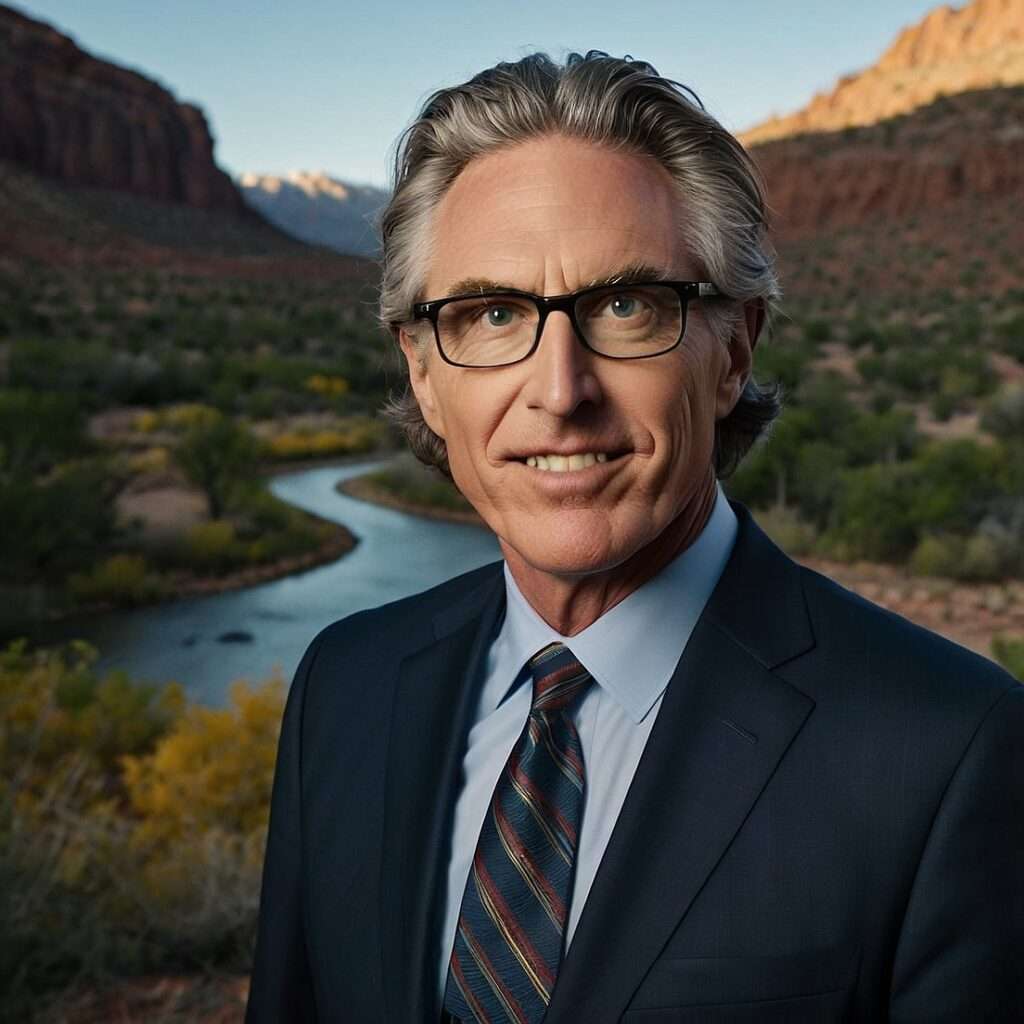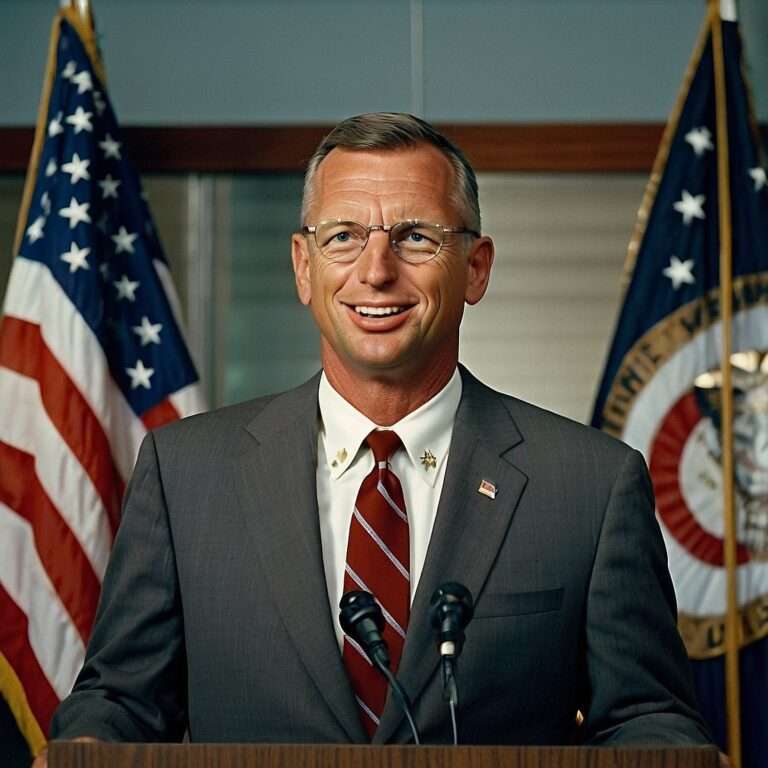
Doug Burgum, nominee for Secretary of the Interior, poses in front of a natural landscape, reflecting his focus on energy policies and public land stewardship.
Doug Burgum, the Governor of North Dakota and a figure well-versed in energy and natural resource management, has been nominated for the role of Secretary of the Interior. Known for his strong advocacy of energy development and rural economies, Burgum’s nomination signals a push toward expanding resource extraction on federal lands. However, critics warn that his policies could come at the cost of environmental protections and climate action.
This analysis dives into Doug Burgum Secretary of the Interior, exploring his qualifications, policy priorities, and the controversies surrounding his nomination.
Who Is Doug Burgum? Background of the Secretary of the Interior Nominee
Leadership in North Dakota
Doug Burgum has served as North Dakota’s Governor since 2016, building a reputation for his pro-energy stance and economic initiatives. Before his political career, Burgum was a tech entrepreneur, founding Great Plains Software, which was later acquired by Microsoft. His background blends business acumen with a focus on resource management.
Experience in Energy and Natural Resources
As Governor, Burgum has championed policies that promote oil and gas development while balancing agricultural and rural economic growth. His leadership reflects a deep understanding of energy markets, particularly in managing the Bakken Formation, one of the largest oil-producing regions in the United States.
Potential Policies of Doug Burgum Secretary of the Interior
Doug Burgum’s Focus on Energy Development as Secretary of the Interior
Burgum’s policies are expected to focus on increasing energy production on federal lands, including oil, gas, and coal. His leadership could lead to:
- Boosted Domestic Energy Production: Opening more federal lands to drilling and mining to reduce reliance on foreign energy sources.
- Economic Growth in Energy States: Supporting job creation and local economies in energy-producing regions like North Dakota, Texas, and Wyoming.
Balancing Resource Use with Conservation
Burgum has occasionally emphasized the need for responsible resource management, but critics question whether his policies will prioritize conservation. Key challenges include:
- Public Land Protections: Balancing energy development with protecting national parks and public lands.
- Renewable Energy Investment: Ensuring that renewable energy initiatives receive equal attention alongside traditional resource extraction.
Challenges and Controversies Surrounding Doug Burgum Secretary of the Interior
Environmental Concerns in Doug Burgum Secretary of the Interior Leadership
Burgum’s tenure as Governor has faced criticism from environmental groups for prioritizing fossil fuel development over climate action.
- Weakened Environmental Protections: Critics argue that Burgum’s policies risk undermining key environmental regulations to favor energy companies.
- Impact on Public Lands: Increased drilling on federal lands could lead to habitat loss, water contamination, and increased greenhouse gas emissions.
Potential Conflicts of Interest
Given Burgum’s ties to the energy industry and his focus on oil and gas development, some question whether he can fairly balance industry interests with the Department of the Interior’s mission to protect natural resources.
What Supporters Say About Doug Burgum as Secretary of the Interior
Energy Expertise and Economic Focus
Supporters argue that Burgum’s energy expertise and business background make him uniquely qualified to manage the Interior Department’s vast responsibilities.
- Proven Leadership: Burgum’s experience in balancing North Dakota’s economic and energy priorities demonstrates his ability to navigate complex policy challenges.
- Energy Independence Advocate: Proponents claim his focus on domestic energy production aligns with national security and economic goals.
Pragmatic Approach to Resource Management
Supporters believe Burgum will bring a pragmatic perspective to resource management, promoting responsible development while ensuring economic benefits for rural communities.
“Doug Burgum understands the importance of leveraging natural resources for economic growth while addressing rural America’s needs,” said one industry analyst.
Balancing Renewable Energy Growth with Doug Burgum’s Policies
Burgum’s leadership as Secretary of the Interior will be defined by his ability to balance competing priorities. While his focus on energy expansion resonates with rural and energy-producing states, it raises significant questions about the long-term impact on public lands and climate goals.
Addressing Renewable Energy Growth
Burgum’s policies will need to address the growing demand for renewable energy and its integration into public lands management. Without a clear plan, critics fear that renewable energy projects may take a backseat to fossil fuel development.
Building Bipartisan Support
Given the Interior Department’s role in managing public lands and cultural heritage, Burgum’s policies will require broad support to succeed. Finding common ground between energy advocates and environmental groups will be essential to his legacy.
Concluding Reflections on Doug Burgum Secretary of the Interior
The Doug Burgum Secretary of the Interior analysis presents a nominee with deep expertise in energy and natural resources but one who remains polarizing due to his pro-fossil fuel stance.
Strengths
- Energy Expertise: Extensive experience in managing energy resources and fostering rural economic growth.
- Economic Benefits: Focus on job creation and energy independence could boost domestic industries.
Challenges
- Environmental Concerns: Critics argue his policies may weaken protections for public lands and ecosystems.
- Climate Action: Potential lack of emphasis on renewable energy and climate goals could create long-term challenges.
Doug Burgum’s success as Secretary of the Interior will depend on his ability to balance resource extraction with environmental stewardship. His policies will shape the future of America’s public lands, energy independence, and climate strategy for years to come.
DARWIN’s Take: Doug Burgum and the Battle for America’s Lands
Doug Burgum’s nomination as Secretary of the Interior feels like a calculated nod to America’s energy ambitions. As Governor of North Dakota, Burgum embraced fossil fuel development with fervor, transforming his state into a symbol of energy independence. But the Interior Department is more than an energy office—it is the custodian of America’s public lands, cultural heritage, and ecological future. The question is: can Burgum reconcile these competing identities?
“Burgum enters this role as a master of resource extraction, but can a champion of fossil fuels embrace the responsibilities of preservation?”
Burgum’s policies are likely to favor expanded drilling and mining on federal lands, fueling job creation and energy production. Yet, critics fear this approach may sacrifice environmental protections and sideline the growing demand for renewable energy. America’s public lands are not just assets to be tapped—they are living ecosystems, cultural landmarks, and sanctuaries for future generations.
“Leadership at Interior demands more than balancing a budget or approving a project—it requires balancing the soul of the land with the needs of its people.”
The tension between economic growth and environmental stewardship is not new, but Burgum’s nomination sharpens the stakes. His success will hinge on whether he can address the climate crisis without alienating the energy industries he has long championed. If he fails, the cost will be counted in degraded landscapes, diminished biodiversity, and lost opportunities for renewable innovation.
“Burgum’s legacy will not be measured in barrels of oil or acres drilled—it will be judged by whether he preserved the spirit of America’s lands while managing their resources.”
Doug Burgum’s tenure as Secretary of the Interior is a test of America’s values. Will we prioritize short-term energy gains, or will we honor the stewardship of lands that define our collective identity? His appointment forces us to confront an uncomfortable truth: the choices we make today will shape the landscapes—and the lives—of tomorrow.
Sources
Further Reading on Paranoid Prophet
- RFK Jr.: A Game-Changing Nominee for Secretary of Health and Human Services
- A focused examination of RFK Jr.’s nomination, exploring the potential impact and controversie surrounding his appointment as Health Secretary.
- The National Divorce: Could Secession Solve America’s Deep Divides?
- Explore how polarization impacts governance and public trust, offering insights into the challenges RFK Jr. would face as a reformer in public health.
- Matt Gaetz Human Trafficking Allegations: Media Smear Campaign or Manufactured Scandal?
- This article delves into the complexities of political scandals and media narratives, providing context on the challenges public figures like RFK Jr. may encounter in the public eye.
- Trump’s Second-Term Cabinet Picks: The Team Shaping His New Administration
- An analysis of the political dynamics and implications of cabinet appointments, offering insights into the environment RFK Jr. would navigate as a potential Health Secretary.
Sources for Further Reading on Doug Burgum’s Nomination as Secretary of the Interior
- “Trump makes it official, announces North Dakota Gov. Doug Burgum as Department of the Interior secretary”
Fox News reports on President-elect Donald Trump’s announcement of Doug Burgum’s nomination, highlighting his background and the administration’s expectations. Fox News - “Trump Taps North Dakota Gov. Doug Burgum For Interior Chief, Energy Czar”
HuffPost discusses Burgum’s dual role as Secretary of the Interior and head of the National Energy Council, examining potential policy directions and industry reactions. HuffPost - “What to know about Doug Burgum, Trump’s choice to run the Interior”
Associated Press provides an overview of Burgum’s career, his stance on energy and environmental issues, and the implications of his nomination. Associated Press - “Trump picks North Dakota governor to lead Interior”
Politico analyzes the political and environmental ramifications of Burgum’s appointment, including reactions from various stakeholders. Politico - “Donald Trump picks Doug Burgum to lead Department of the Interior”
Newsweek explores the significance of Burgum’s nomination, considering his previous policies and potential impact on federal land management. Newsweek - “What to know about Doug Burgum, Trump’s pick to lead Interior”
The Hill delves into Burgum’s background, policy positions, and the challenges he may face in his new role. The Hill - “Trump gave Interior nominee one directive for a half-billion acres of US land: ‘Drill.'”
Associated Press examines the directive given to Burgum to expand drilling on federal lands, discussing potential environmental and economic impacts. Associated Press - “Tribes pleased with Doug Burgum cabinet nomination”
ICT News reports on the positive reactions from tribal communities regarding Burgum’s nomination, highlighting his previous engagements with Native American tribes. ICT News
FAQ Section for Long-Tail SEO: Doug Burgum Secretary of the Interior
Doug Burgum’s Background and Policy Focus
Q: Who is Doug Burgum, and why was he nominated for Secretary of the Interior?
A: Doug Burgum is the Governor of North Dakota, known for his expertise in energy and natural resource management. His nomination as Secretary of the Interior reflects a focus on expanding domestic energy production and managing federal lands.
Q: What is Doug Burgum’s experience in energy and natural resources?
A: As Governor, Burgum has managed North Dakota’s significant energy resources, including the Bakken Formation, one of the largest oil-producing regions in the U.S. His policies have emphasized balancing resource development with economic growth.
Q: What policies is Doug Burgum expected to prioritize as Secretary of the Interior?
A: Burgum is likely to prioritize opening federal lands to increased energy development, including oil, gas, and coal production. Supporters expect a focus on boosting domestic energy independence and rural economic growth.
Q: How might Doug Burgum’s policies affect public lands?
A: Burgum’s policies could increase energy production on federal lands, which may lead to greater economic benefits for energy states. However, critics argue this focus could compromise environmental protections and public land conservation.
Q: How does Doug Burgum view renewable energy development?
A: Burgum has expressed support for renewable energy but prioritizes fossil fuels as essential for energy security. His approach may integrate renewables, but critics worry these efforts may lag behind traditional energy development.
Challenges, Controversies, and Potential Impact
Q: What controversies surround Doug Burgum’s nomination as Secretary of the Interior?
A: Critics highlight Burgum’s ties to the fossil fuel industry and his focus on expanding drilling on federal lands. Environmental groups worry his policies may weaken protections for ecosystems and public lands.
Q: How will Doug Burgum address climate change as Secretary of the Interior?
A: Burgum has not emphasized climate change in his policies, focusing instead on energy production. Critics argue his stance may slow progress on federal climate initiatives, while supporters say his approach balances economic and environmental concerns.
Q: What do supporters say about Doug Burgum’s nomination?
A: Supporters praise Burgum’s expertise in energy markets and his ability to manage natural resources effectively. They argue his leadership will strengthen energy independence and create jobs in energy-producing regions.
Q: How will Doug Burgum’s policies affect rural communities?
A: Burgum’s focus on energy development could benefit rural economies by creating jobs and increasing revenue in energy-rich states. However, critics caution that environmental degradation could disproportionately impact rural areas.
Q: What are the long-term implications of Doug Burgum’s leadership?
A: Burgum’s tenure will likely define the balance between energy production and environmental conservation on federal lands. His policies could shape America’s energy strategy and land management priorities for decades.


